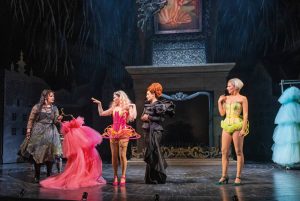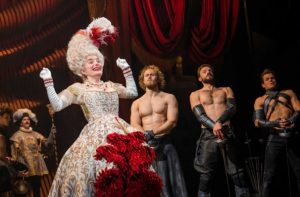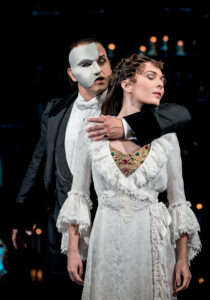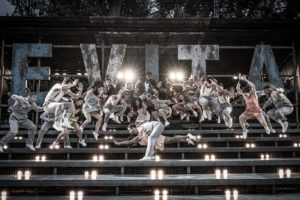Ignore The Butcher Of Broadway, this is a winning show
★★★★

Andrew Lloyd Webber’s Cinderella opened to largely positive reviews but more recently the production has been butchered by the New York Post’s Johnny Oleksinski, potentially scuppering a Broadway launch.
According to Britain’s leading showbiz reporter Baz Bamigboye of the Daily Mail, Milord Lloyd Webber is so concerned that he is considering revising the show. So what did the new Butcher of Broadway (Baz’s description) say about Cinderella, and why do I disagree with him?
I don’t need to sum up Johnny’s opinion because he does it himself: ‘Bibbidi-bobbidi-cut 30 minutes! Bibbidi-bobbidi-scrap the set and costumes! Bibbidi-bobbidi-more jokes and dancing!’
The Butcher Of Broadway (Baz’s description) first buries his cleaver into the writer of the book and original story, Emerald Fennell:
‘Problem is this revisionist “Cinderella” isn’t dark and brooding like “The Phantom of the Opera.” With a book by Oscar-winning “Promising Young Woman” scribe Emerald Fennell, it fancies itself a musical comedy, like “Guys and Dolls” or “Hairspray.” But at the matinee I attended, the silent crowd might as well have been watching Ibsen.’
An audience can enhance or dampen your enjoyment, and I’ve sat through a few ‘dead’ matinees in my time. So, the ‘silent crowd’ could have affected Johnny’s appreciation of the show. At the performance I attended (which was a Sunday matinee, by the way) the audience laughed, cheered and clapped throughout, ending with an almost universal standing ovation. I can’t deny that the atmosphere added to the pleasure I got from the show.
The Transformation scene just before the interval did leave me feeling underwhelmed (it’s no Wicked or Phantom in that respect) but the Ball at the opening of act two more than made up for that.
Too long? I enjoyed every minute
‘For a straightforward tale, the show takes its sweet time — a good two hours, 45 minutes all told,’ continues Johnny.
First of all, that timing includes a 20 minute interval so it’s actually well under two-and-a-half hours, which is quite short for a musical. I guess any new show can be tightened up, once the audience’s reaction has been gauged, but I myself would be hard pressed to know what to cut since I enjoyed every minute.
So what is this apparently longwinded ‘revisionist’ story? You don’t need me to tell you that it concerns a ‘Bad Cinderella’, that earworm has been widely played. She lives in Belleville, a tourist destination whose attraction is based on the physical beauty of its citizens. Cinderella is a rebel whose activities undermine the town’s reputation. She’s in love with her best (and only) friend, the heir apparent Prince Sebastian. Not Prince Charming who has been lost, presumed dead, in a war. Sebastian loves her too but neither will admit it for fear of damaging their friendship.
She falls into the trap of believing he wants a glamorous beauty queen and undergoes a transformation at the hands of a nip-and-tuck Godmother. Inevitably her plan goes wrong and there are a few twists and turns before the happy ending.
The so-called ‘revisionist’ message is that you shouldn’t judge by appearances, and that character is more important. There is a wonderful moment when a macho male character reveals that he is gay and introduces us to his fiancé. There was a spontaneous roar of approval from the audience which made me feel delighted at the way in which public attitudes have changed since I was a lad, a feeling tempered only slightly after the show when I heard a woman say: ‘I didn’t know where to look when the two men kissed.’
So, for me, an interesting story, with plenty of twists and fun.
Scrap the set and costumes? This is a fairy tale, not a concert
‘Scrap the set and costumes… drab and forgettable,’ moans Johnny. His recommendation seems to be a ‘bare stage’, or at least that’s when he says this production was at its best. I expect he’s looking forward to the concert version. There is a short time when the stage is bare but I totally disagree that this was an advantage. This is a fairy tale, even if it’s been turned on its head, and it needs a fairy tale look. And, for me, that’s what we get with Gabriela Tylesova’s set which is a mixture of the rococo style of 18th century France and Bavarian castles, reflecting the time when the version of Cinderella we know and love was written. At the same time, it is not done in icing cake colours and is surrounded by slightly sinister thorns, suggesting that all is not well in Belleville.

Her costumes are clever too. We have bare-chested, muscular men in tight lederhosen, evoking the mid-European period setting while emphasising their macho narcissism. The women are given sumptuous, brightly coloured gowns but with sexually suggestive splits, underlining their shallow attitude to relationships. Except, of course, for the rebellious Cinderella , who is clothed like a Goth with a black dress and Doc Martins.
‘More jokes and dancing,’ pleads Johnny. It’s hard to understand why he would want more jokes because Cinderella is full of innuendoes. Maybe he just doesn’t find that kind of joke funny. Admittedly some hit the mark, some missed, and some were deliberately designed to make you cringe. For example, one of the hunky knights invites Cinderella to ‘polish my sceptre’.
Rival mothers Rebecca Trehearn as the Queen and Victoria Hamilton-Barritt as Cinderella’s stepmother got plenty of laughs for their Ab Fab haughtiness and sly bitchiness.
David Zippel‘s lyrics have wit and feeling. Take Bad Cinderella:
Yes I’m bad Cinderella, I will not say goodbye
You’ve been hateful since I met you
Barking mad Cinderella, flying high in the sky
And I hope I have upset you
Well, forget you!
As for dancing, they never stopped moving from the opening number of villagers going about their business- and admiring the baker’s buns (more innuendo)- to the Finale. Joann M Hunter‘s choreography is imaginative, energetic and stage-filling, and totally in tune with the varying moods.
The Butcher Of Broadway also takes the boning knife to the director Laurence Connor, declaring that his ‘plodding, one-note direction is the production’s biggest offender’. If you find a show dull, it’s likely the blame lies with the author, the director or the cast. These are not always easy to separate. I found the production had plenty of pace, and struck many different notes between energetic ensemble numbers, comic routines and the pathos of love gone wrong. I would attribute this to the director bringing out the best of the book, cast and music.
Johnny praises the cast but, as I said, it can be hard to separate direction and cast, so, if the show was plodding on the day Johnny attended, it is possible that some of the performers were having an off day. It does happen that a cast, especially at a matinee, just don’t generate the energy needed for a show like this. Baz Bamigboye reported that Andrew Lloyd Webber had had a go at the cast, following Johnny Oleksinski‘s review, so maybe he thought some of their performances needed sharpening, rather than the direction. I obviously don’t know and I can only say the cast were full of energy and commitment when I saw them a few days later, and gave some excellent perofrmances.
Carrie Hope Fletcher leads an excellent cast
Carrie Hope Fletcher plays Cinderella. She has such an open-faced smile and sweet, powerful voice that’s it’s hard to imagine anyone else playing the part. However, her alternate Georgina Onuorah has had many favourable comments, and that’s who Johnny saw, and liked.
Ivano Turco as Prince Sebastian has a good singing voice and conveyed well this shy, sensitive, good-hearted lad.
And then there’s the music. Here Johnny and I agree. He praised Lloyd Webber’s ‘heart-racing ballads’. He’s right. Bad Cinderella is a stand-out song but the slower, plaintive, soaring ballads Only You, Lonely You sung by Prince Sebastian and Cinderella’s I Know I Have A Heart represent Andrew Lloyd Webber on top form. I’ve never been a big fan of his lush light operatic music but I freely acknowledge he can write a good tune. In this case, his traditional melodic style and big orchestral arrangements seem perfect for the subject matter.
Johnny Oleksinski feels ‘There is a satisfying musical buried somewhere in Andrew Lloyd Webber’s “Cinderella”. ‘ Once they’ve added more jokes and dancing, cut half an hour, and changed the story, script, sets, costumes, and director, presumably.
I wonder if there is a clue in the way Mr Oleksinski writes his review as to why he is critical of so much of the production. Right at the beginning, his reference point is the 1950 Disney film Cinderella. ‘Bibbety Bobbity’ he quotes. Could it be the British lord inadvertently trampled on an American child’s happy memory?
We British on the other hand have been brought up with Cinderella pantomimes in which subversion (and innuendo) are the norm. There’s no Buttons in this production, a character who traditionally loves Cinderella for what she is rather than her shoe size, even if his love is unrequited. However, that panto character prepares us nicely for Prince Sebastian’s attitude. Then there are the panto traditions, derived from 19th century music hall, of men playing female characters like the wicked stepmother and the ugly sisters, or women playing the so-called principal boy part of Prince Charming. We’re well used to a bit of rule-breaking, which is what this Cinderella celebrates.
To be clear, this is not a pantomime, it’s an excellent musical with Andrew Lloyd Webber on good form, a satisfying story and a scintillating production. I hope those involved don’t take too much notice of Johnny Oleksinski. After all, he didn’t like Caroline, Or Change with Sharon D Clarke either. And that was one of the best British productions of the last decade, winning her an Olivier Award.
Watch the video of this review on our YouTube channel
Andrew Lloyd Webber’s Cinderella is currently performing at the Gillian Lynne Theatre in London. For more information and tickets, click here.



